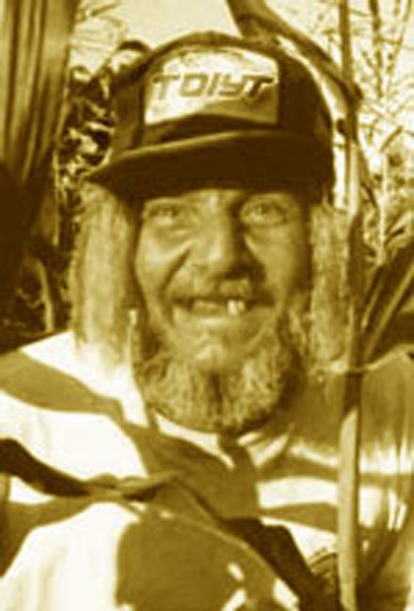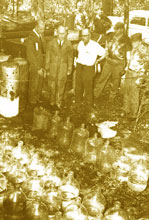|

Frederich Vontoiyt IX
Ibiza 1954
|
13th Century, somewhere in western Europe
Early in 1224, after withstanding numerous crusades against them, the Holy Roman Emperor Frederich II announced that the citizens of Livonia and Prussia, along with people in a number of neighboring provinces, were under "Imperial immediacy". This effectively made them royal territories under the protection of Rome. For many of the people in these provinces, this act was a life saver.
While in Prussia, the Emperor received a message from a woman pleading for his assistance. She was carrying the child of a notable Prussian warrior who had been killed in battle and she feared that if her pregnancy were discovered, she and her unborn child would be tortured and killed. According to the Emperor's aide, the woman possessed remarkable beauty.
Intrigued, the Emperor met with her to evaluate the legitimacy of her fears. Convinced, he directed his scribe to prepare a scroll which he then signed and gave to her with instructions to leave the region immediately. If stopped en route to safer territories, she was to present the scroll and should expect to be granted safe passage. The scroll read, "The bearer of this scroll is Ms. Constance Von Toiyt, she is on business of an urgent nature for his highness The Holy Roman Emperor and is to be granted shelter and assisted to gain safe passage. Any who violates this order shall subject themselves and their family to the wrath of the Roman Empire."
The significance of this gesture was immediately evident to the newly named "Constance Von Toiyt". The first name was that of the Emperor's mother, something that many people knew. The prefix "Von" identified her as a descendant of a royal lineage. As for the surname, the Emperor, finding "Constance" exceptionally beautiful and possessing a dignity rare among peasant women, chose the word "Toiyt", adopting the use of an often used term of the day which meant "of exquisite beauty or quality".
For the first time in history, as Constance left the Emperor's quarters, a member of the Von Toiyt family entered the world population.
Constance made her way cross country, utilizing the scroll to gain shelter and safe passage through hostile lands numerous times. Ultimately she settled in Amsterdam, where she found work and a place to live. Several months later she gave birth to a baby boy. In honor of the man who she believed saved her life, she named the boy Frederich.
Frederich Von Toiyt IV
The VonToiyt family history was relatively non-descript until the beginning of the 16th century when an unfortunate hunting accident left a 12 year old boy orphaned in a hostile world. Frederich Manfred VonToiyt IV was 12 when he began to demonstrate the combination of brilliance and audacity that the family name would become known for.
Frederich was born the son of Emerson Errol Von Toiyt and Freschetta Brandella Von Toiyt. Frederich was a clever young man who's mother died during the birthing process in January of 1501. By the tender age of 12, Frederich had developed a fondness for a Viking grog that his father had introduced to him during a beaver hunt on his 8th birthday. One day while hunting, Erik Fondessen, a giant of a man, well known for bringing in more than his share of wild game, but also well known for swinging his club at almost any noise or sudden movement, struck Emerson on the head with his hunting club and knocked him dead.
As all would come to know, the men were stalking a large beaver pond on the day in question and both had consumed excessive amounts of grog. At one point, Emerson became violently ill and sunk to his knees next to the water. He was there heaving, clad from head to toe in a full length coat of beaver pelts, when Erik came around the end of the dam. Upon the sight of what appeared to be an unusually large beaver eating by the water's edge, Erik swung his club with keen speed and precision, knocking Emerson dead with a single blow. He complained that he could not be blamed for his instinctive excitement at the sight of such a large beaver and subsequent reaction. Regardless of the details, one thing was certain - a tragic case of mistaken identity had left Frederich an orphan at the age of 12.
During the post burial ceremony, the men of the town consumed all of the remaining grog. The next day, they began to despair over the fact that Emerson had long held the recipe as a close secret and no other man in town knew how to make it. What they didn't know was that Emerson had passed the recipe to one person - Frederich.
Frederich realized that he was in need of a means to support himself. He quickly deduced that he could put his recipe for the beloved grog to good use. After all, he had the home that he and his father had shared and he had something that men would trade for. He saw no reason why he should give grog away freely as his father had done. If they loved it so much, certainly they would trade food and dry goods for it - and he would need such items to survive. So it was that Frederich became the owner/operator of the Emerson Grog House. Named in honor of his father.
He converted the home into a brew pub and began to barter grog for food, clothing and other necessities. Eventually, when he had more than enough supplies to sustain him, he began to wonder what other things he might trade for. He procured a wagon, a mule and all manner of other items he found interesting or useful. Soon, Frederich was being introduced to every young lady in the area by the men who frequented the Grog House. The men would speak volumes of Frederich's admirable qualities, the ladies would inevitably fall for his charms and before long he had a different visitor every night of the week.
Mrs. Frederich Von Toiyt
Bransetta Maier was the 14 year old daughter of a country gentleman named Schviek, and she was a beauty. Schviek was the most wealthy man in the region although little was known about how he came by his wealth. What was known was that he had arrived here from far away with a large collection of wagons and servants and had constructed a large estate on the top of the highest hill outside of town. Schviek was also known to be a very honorable and fair man. Unbeknownst to him, Bransetta was a mischevious vixen. She had blossomed early and she was not choosy about who she shared her treasures with.
As could be expected, it wasn't long before Bransetta became pregnant. She was so distraught that she began to visit the Emerson Grog House on a regular basis where Frederich would give her all the grog she desired. One day, while heavily intoxicated, she confessed to Frederich that she had shared special times with several of the young men in town and that she was going to give birth to a child, but that she didn't know who the father was. She was certain that her father would banish her from his estate and feared she would live the rest of her life in shame.
Frederich, knowing that Mr. Meier was very wealthy and a man of integrity, saw an opportunity to take a major step forward in the world. He told Bransetta what he had in mind and a couple of days later, he called a meeting in the town square where he announced that he and Bransetta had fallen in love. Then, in front of the entire town, he asked Schveik Meier for permission to marry her. It was a bold move and one that none expected. Dumbstruck, Schveik Meier granted his permission. Within a month, the two were wed in the town square, right next to the fountain that also served as the town well. On their wedding night, the good fortune Frederich had hoped for was delivered. Schveik called the two to his study and presented them with a large chest, assuring them that its contents would ensure that they were always able to provide handsomely for their family. Upon lifting the lid, the two found that the chest was filled to the top with gold coins and precious gemstones. All together, the chest contained enough wealth such that they could scarcely spend it all in two lifetimes even living in the most extravagant manner.
Four months later, Bransetta gave birth to a sturdy little boy with shocking black hair, a dramatically protruding browridge and faint signs of facial hair. Schveik Meier was shocked as was the rest of the town. The child was obviously not Frederich's, having none of Frederichs features. No whitish blond hair, no light grey eyes and no aquiline nose. This child did not get its features from its mother either, she was as fair headed and light eyed as Frederich. No, there was no denying it, this child looked disturbingly like Roderick Moorland, a primitive looking and primitively minded man who made ends meet by lifting heavy things for the townsfolk. Roderick was a gentle soul and on one bright spring morning, Bransetta, almost as simple minded as Roderick, shared her special treasures with him and accidentally conceived the son that Frederich would come to claim as his own. They named him Dardavelle.
Frederich and Bransetta would go on to have another child, this one also a boy. He was the spitting image of Frederich, although a little more stocky by the time he reached the age of 12, and he was despised by his older brother.
Bransetta, being the Matriarch of the now wealthy Von Toiyt family and the head matron of the Emerson Grog House, did her best to conduct herself in a manner fitting her station in life. She was, however, quite fond of the Emerson brew throughout her life and had a mischievious streak in her - a combination that sometimes led to embarrassing, if not amusing, events. In fact, it was she that was responsible for the first piece of scandalous family history when she became well known for exposing herself each time she consumed a bit much of the drink. On some occasions, she would disrobe entirely and go for a dip in the fountain/well in the town square. Bransetta enjoyed her public performances well into her later years. Unfortunately, in Bransetta's later years, what had once been a pleasant observance had become more of an eyesore. By then Frederich was a very rich and powerful man, and the townsfolk didn't dare demand that she stop. So they did the only thing they could do. They invented a covering for Bransetta's bosoms that comprised of two stockings in the front, connected by a single piece of twine with the two ends tied together in the back. This covering was not only effective, it was one that Bransetta, being a full bodied woman, could not remove by herself, particularly when she was on the grog. The townsfolk called this covering a "bra" - short for Bransetta.
History is littered with connections between the Von Toiyt family and pivotal moments. Many great victories, great defeats, great scandals and the invention of many modern day necessities can be traced to the Von Toiyts. Generation after generation of Von Toiyt's have created a legacy so rich in coincidence, conspiracy, innovation and scandal, that few can accept the tales as factual.
|

Frederich Vontoiyt VIII
Kentucky
1930

The Townsmen
1928

Emerson Grog House
1930

Emerson Grog
1929

Great Raid of '33

Grog waiting its day
1924

Precious Grog is Dumped after the Great Raid of
'33 |







